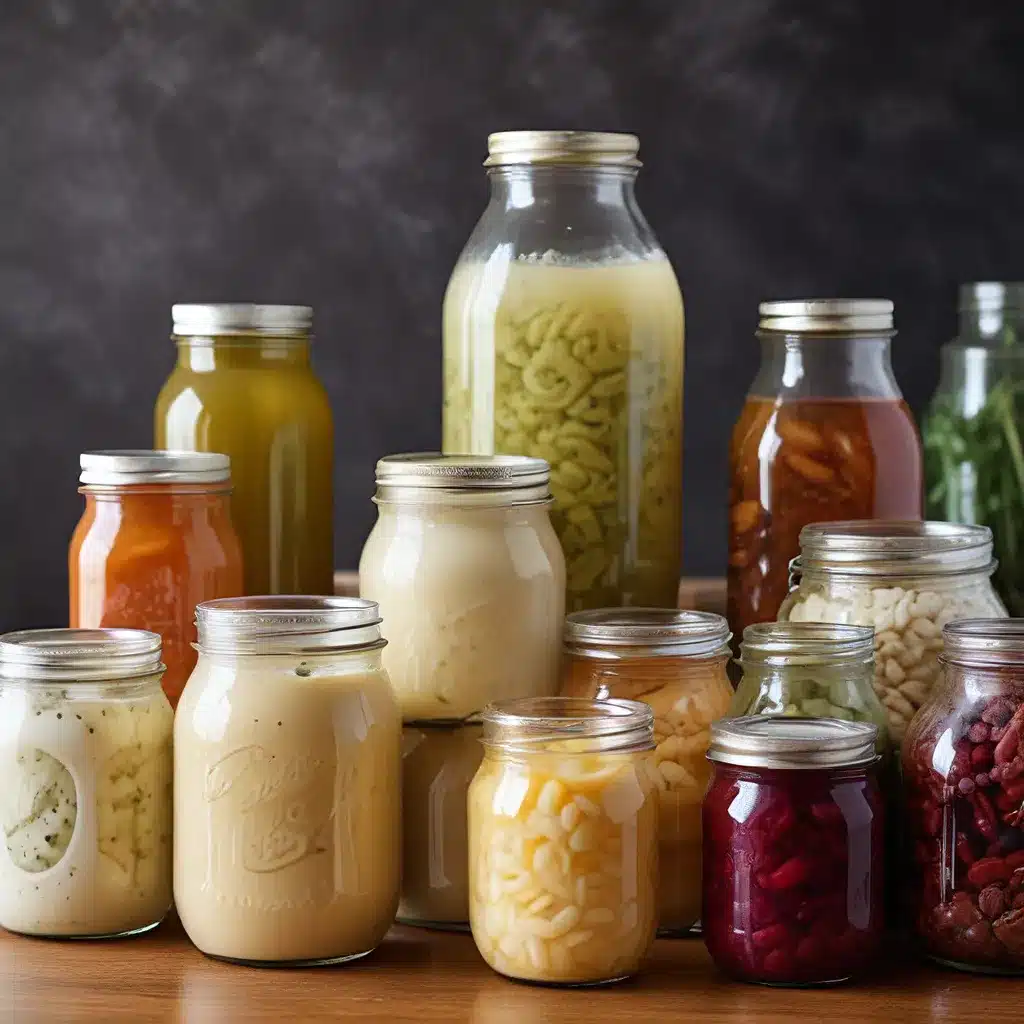
Unleashing the Magic of Fermentation
Have you ever wondered how some of the most delectable and nutritious foods, like sauerkraut, kimchi, and kombucha, come to be? The secret lies in the age-old art of fermentation. As a self-proclaimed foodie (and occasional kitchen science geek), I’m here to take you on a captivating journey into the world of fermentation – a realm where flavors blossom, and health benefits abound.
Fermentation may sound like a complex and intimidating process, but I’m here to demystify it for you. Trust me, once you unlock the secrets of fermentation, your taste buds and gut will thank you. So, let’s dive in and explore the wonders of this ancient culinary technique.
The Basics of Fermentation
At its core, fermentation is the process by which microorganisms, like bacteria and yeast, convert sugars and carbohydrates into other compounds. This transformation can result in a wide array of flavors, textures, and even health benefits. The magic happens when these tiny microbial allies do their thing, often in an anaerobic (oxygen-free) environment.
One of the key players in the fermentation game are lactic acid bacteria, or LAB. These beneficial bacteria are responsible for transforming sugars into lactic acid, which gives fermented foods their signature tangy, sour, or even fizzy qualities. Sauerkraut is a prime example of a fermented food where LAB take center stage, transforming cabbage into a gut-friendly delight.
But LAB aren’t the only microbes that can work their magic. Yeast, for instance, is another crucial player in the fermentation arena. These single-celled fungi convert sugars into alcohol and carbon dioxide, resulting in the bubbly effervescence we associate with beverages like kombucha.
The interplay between these various microorganisms is what gives fermented foods their unique and captivating flavors. By understanding the basics of fermentation, you can unlock a world of culinary and gastronomic possibilities.
The Health Benefits of Fermentation
Fermentation isn’t just about flavor – it also delivers a wealth of health benefits. When you consume fermented foods, you’re essentially ingesting a bounty of probiotics, which are live, beneficial bacteria that can do wonders for your gut health.
These probiotic powerhouses can help restore the natural balance of your gut microbiome, aiding in digestion, nutrient absorption, and even supporting a healthy immune system. Studies have shown that a diverse and thriving gut microbiome can have far-reaching effects on our overall well-being, from mental health to cardiovascular function.
But the benefits of fermentation don’t stop there. Fermented foods are often rich in antioxidants, vitamins, and minerals that can boost your overall nutritional intake. For example, sauerkraut is an excellent source of vitamin C, while kombucha contains a variety of B vitamins and organic acids that can aid in detoxification.
Incorporating fermented foods into your diet is a simple and delicious way to support your gut health and overall well-being. Whether you’re a seasoned fermentation enthusiast or a curious beginner, the world of probiotics awaits.
Exploring the Flavors of Fermentation
One of the most exciting aspects of fermentation is the sheer variety of flavors it can produce. From the sharp, tangy notes of sauerkraut to the effervescent, slightly sweet taste of kombucha, the possibilities are truly endless.
Lacto-fermentation, in particular, is a technique that can transform a wide range of fruits, vegetables, and even dairy products into flavor-packed delicacies. Imagine the bold, umami-rich notes of fermented kimchi, or the subtle, earthy tones of fermented beets.
The best part? You can experiment with different ingredients, spices, and techniques to create your own unique fermented creations. Whether you’re a seasoned home cook or a curious beginner, the world of fermentation is your playground. Who knows, you might even discover your new favorite condiment or beverage along the way.
Getting Started with Fermentation
If the idea of fermentation has piqued your interest, you might be wondering where to begin. The good news is that with a little bit of knowledge and the right equipment, you can start your fermentation journey right at home.
One of the most accessible and beginner-friendly fermentation projects is sauerkraut. All you need is some cabbage, salt, and a few simple tools. The process is relatively straightforward, and the end result is a tangy, crunchy delight that pairs beautifully with sausages, sandwiches, or even as a standalone snack.
Another popular fermentation project is kombucha, a fizzy, probiotic-rich tea that can be customized with a variety of fruit juices and herbs. While the initial setup may require a bit more effort, the rewards of brewing your own kombucha at home are well worth it.
As you delve deeper into the world of fermentation, you’ll discover a wealth of resources, from cookbooks to online communities, that can guide you through the process. And remember, the best way to learn is by experimenting and having fun with it.
So, what are you waiting for? Grab your fermentation gear, explore the endless possibilities, and get ready to unlock a whole new world of flavors and health benefits. Who knows, you might even discover your inner Saint Marc USA – a fermentation aficionado with an insatiable appetite for the extraordinary.

